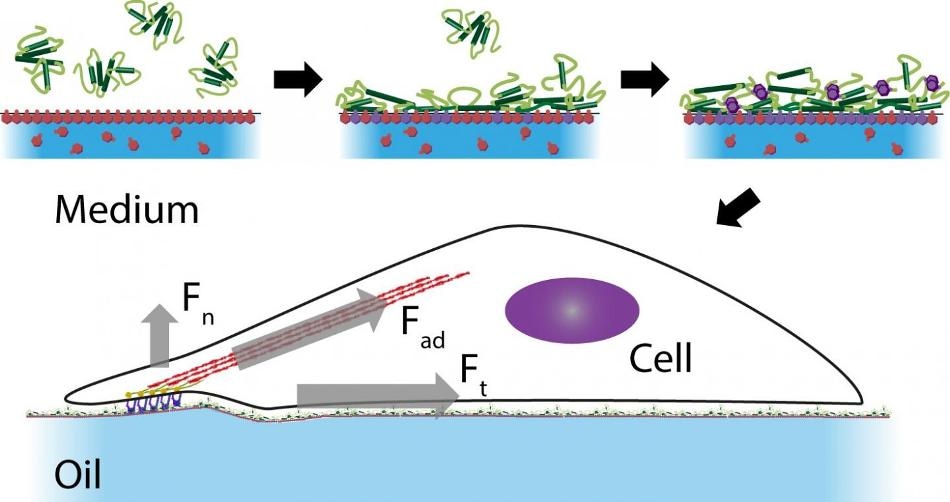Feb 19 2018
According to a recent discovery by a team of researchers at the Queen Mary University of London, cells can 'walk' on liquids quite like the way geckos stick to other surfaces.
 Protein nanosheet assembly displaying strong mechanical properties allow cell adhesion and proliferation at the surface of liquids. (Image credit: Julien Gautrot)
Protein nanosheet assembly displaying strong mechanical properties allow cell adhesion and proliferation at the surface of liquids. (Image credit: Julien Gautrot)
Cells are normally grown on solid materials, such as degradable polymers, tissue culture plastic, and bioceramics. It is thought that the strong mechanical properties of these biomaterials are necessary to allow cell adhesion, a vital process often regulating the behavior of stem cells and promoting implant integration by surrounding tissues and tissue regeneration.
In this research, published in Nano Letters, the researchers describe the successful growth of skin cells at the surface of liquid oil droplets.
This is unanticipated as the low viscosity of liquids is not supposed to support the mechanical forces produced by cells during their adhesion.
The research team found out that protein nanosheets, films just a few nanometers thick, assemble at the surface of such liquids and display strong mechanical properties adequate to resist cell-generated forces.
By integrating varied types of mechanical characterization techniques at the nanoscale, they suggest that cell adhesion to such liquids is not facilitated by surface tension, as in the case of the walking of water striders, but more similar to the adhesion of geckos to a broad range of surfaces, in which shear forces play a crucial role.
Lead author Dr. Julien Gautrot, from Queen Mary's School of Engineering and Materials Science, said: "Understanding the mechanisms responsible for this behavior is important as it suggests that the nanoscale properties, rather than their bulk properties, controls cell adhesion and potentially other cell behavior. This will have important implications for the design of a new generation of biomaterials for regenerative medicine and tissue engineering."
He added: "This means that nanoscale properties of biomaterials or tissue engineering scaffolds can be engineered independently of bulk properties to control cell phenotype and scaffold mechanics separately."
Liquid-liquid systems, such as emulsions like vinaigrette, are particularly beneficial to a broad range of technologies and processing. They are repeatedly used in chemical engineering and chemical synthesis where they have transformed industrial processes. In contrast, cell culture and stem cell technologies have not profited from the flexibility of liquid-liquid systems.
The team proposes the study could result in the design of a new generation of cell technologies, for the better production of adherent stem cells for regenerative medicine.
The research was carried out in partnership with Umea University, Sweden.
The research received funding from the Engineering and Physical Sciences Research Council (EPSRC) and the Swedish Foundation for International Cooperation in Research and Higher Education.